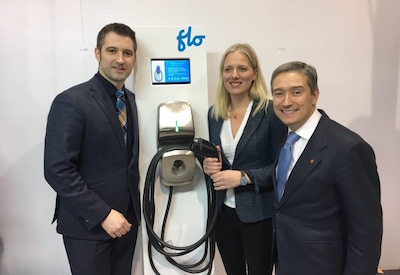NRC Contributes $6.7M to Development of AddEnergie Next Gen EV Charging Technology

February 28, 2017
AddEnergie has received $6.7 million in financial backing from Natural Resources Canada to develop charging technologies that will support transportation electrification across the country.
AddEnergie will invest $7.3 million in this $16.9 million initiative. The initiative will also benefit from a $748,000 contribution from Quebec’s Ministry of Economy, Science and Innovation and $1.9 million from various private partners. (Shown in photo: Louis Tremblay, president and CEO of AddEnergie, Catherine McKenna, federal Minister of Environment and Climate Change, and François-Philippe Champagne, federal Minister of International Trade and member of Parliament for Saint-Maurice—Champlain.)
Ultimately, the projects made possible by this funding will help create 86 permanent jobs over five years and prevent emissions of over 880,000 tonnes of greenhouse gases (GHGs). They will also see more than 1,000 new charging stations installed across Canada by 2019, which will contribute to the expansion of the Canada-wide FLO charging network, operated by AddEnergie.
The announcement was made during a visit by Catherine McKenna, and François-Philippe Champagne to the AddEnergie production plant in Shawinigan, PQ.
Solutions to the challenges of electrification
This support will allow AddEnergie to develop the next generation of fast-charging stations for EVs, serving a greater variety of EV models that will be available to consumers in the next five years.
It will also enable AddEnergie to continue developing a new business model that will help Canadian consumers and businesses access charging services on a monthly subscription basis, much like cable television service. This formula will address the cost barrier involved in acquiring and installing charging infrastructure in both the residential and commercial markets.
Finally, AddEnergie will use the federal funding to install charging stations designed especially for curbside use in five major Canadian cities, using expertise developed during the rollout of several hundred such stations in Montreal in partnership with Hydro-Québec and the city.











![Guide to the Canadian Electrical Code, Part 1[i], 26th Edition– A Road Map: Section 56](https://electricalindustry.ca/wp-content/uploads/2022/11/Guide-CE-Code-2.png)



